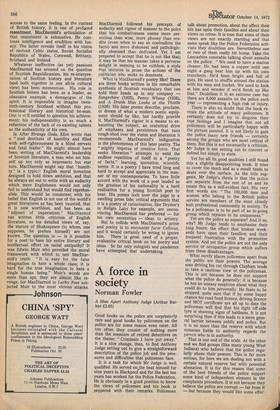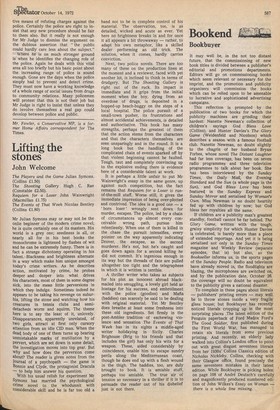A force in society
Norman Fowler
A Man Apart Anthony Judge (Arthur Barker £2.65) Good books on the police are surprisincly rare and good books by policemen on the police are for some reason even rarer. All too often they consist of nothing more than the memoirs of retired detectives on the theme: "Criminals I have put away." It is a nice change, then, to find Anthony Judge setting out to give a straightforward description of the police job and the pressures and difficulties that policemen face.
It is a task for which Mr Judge is well qualified. He served on,.the beat himself for nine years in Blackpool and for the last ten years has worked for the Police Federation. He is obviously in a good position to know the views of policemen and his book is peppered with their remarks. Policemen talk about promotion, about the effect their life has upon their families and about their views on crime. It is true that some of their views are not exactly startling and that some speak like the Police Federation activists they doubtless are. Nevertheless one or two of them really hit home, Take the Lancashire constable talking about assaults on the police: "We used to have a station cleaner. He had been a copper until one night a gang beat him up with his own truncheon. He'd been bright and full of guts. He used to shuffle around the station with his mop and bucket. We used to look at him and wonder if we'd finish up like that." Doubtless it is an extreme case but there are 8,000 assaults on the police each year — representing a 'high risk of injury.
There is also no doubt that the book reveals the attitude of many policemen. It certainly does not try to disguise their true feelings and I imagine that not all policemen will be particularly happy with the picture painted. It is not likely to gain the police many new friends — certainly among the groups who are most critical of them. But this is not necessarily a criticism. Mr Judge is not setting out to convert or defend but simply to state.
Yet for all its good qualities I still found this a slightly disappointing book. It tries to cover too much and as a result tends to skate over the surface. As the title suggests, Mr Judge's thesis is that the police are separate from the rest of us and he treats this as a self-evident fact. His very first words are: "The 100,000 men and women who belong to the British police service are members of the most closely knit professional community in society. To be a policeman is to be part of an in-going group which rejoices in its uniqueness."
Yet are the police so separate? And if so, why? Mr Judge tends to emphasise their long hours; the effect that broken weekends have upon their families; and their frequent frustration with the promotion system. And yet the police are not the only service or occupation group which suffers from these disadvantages.
What surely places policemen apart from the public are their powers. The average man driving his car through Clapham tends to take a cautious view of the policeman. This is not because he does not support what the police do generally: it is because he has an uneasy suspicion about what they could do to him personally. He fears to be stopped, quite sure that if by some happy chance his road fund licence, driving licence and MOT certificate are all up to date the policeman will find that his right off-side tyre is showing signs of baldness. It is not surprising then if this leads to a more general barrier between public and police. But it is no more than the reserve with which someone liable to authority regards the person who is in authority.
That is one end of the scale. At the other end we find groups (like many young West Indians) who believe that the police regularly abuse their powers. This is far more serious, for here we are dealing not with a certain natural reserve but with potential alienation. It is for this reason that some of the best friends of the police support some kind of independent element in the complaints procedure. It is not because they believe the police are corrupt — far from it — but because they would like some effec tive means of refuting charges against the police. Certainly the police are right to insist that any new procedure should be fair to them also. But it really is not enough for Mr Judge to dismiss the argument on the dubious assertion that " the public could hardly care less about the subject." " Where he is on much stronger ground is when he identifies the changing role of the police. Again he deals with this vital area all too briefly but his basic point about the increasing range of police is sound enough. Gone are the days when the police simply had to prevent and detect crime. They must now have a working knowledge of a whole range of social issues from drugs to community relations. Many policemen will protest that this is not their job but Mr Judge is right to insist that unless they do involve themselves a real gap could develop between police and public.
Mr. Fowler, a Conservative MP, is a former Home Affairs correspondent for The Times.















































 Previous page
Previous page